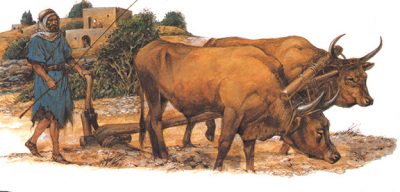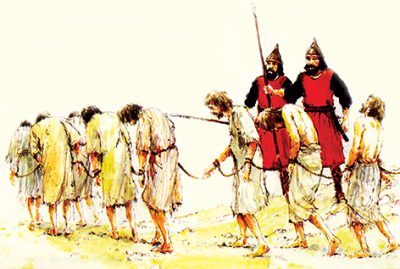×


We have detected your country as:
Please click here to go to the USA website or select another country from the dropdown list.
by: Rev. Terry Mason, Director of International Development
 Have you ever experienced plowing behind a team of oxen? While living in Africa for many years, I was blessed to get plenty of practice in this ancient farming method. At first it seems like a great deal of hard work. The tendency is to try using your own strength to keep the blade of the plow going in a straight furrow. However, you quickly learn to let the natural pull of the chain between the yoke and the plow draw the blade straight with only the occasional adjustment. Oxen are strong creatures—let them do the work!
Have you ever experienced plowing behind a team of oxen? While living in Africa for many years, I was blessed to get plenty of practice in this ancient farming method. At first it seems like a great deal of hard work. The tendency is to try using your own strength to keep the blade of the plow going in a straight furrow. However, you quickly learn to let the natural pull of the chain between the yoke and the plow draw the blade straight with only the occasional adjustment. Oxen are strong creatures—let them do the work!
What is a Yoke?
As disciples and followers of God, it is our choice to take on the yoke of His kingship. If we are to understand what this means, we first need to know what a yoke is. In our modern world, few people have firsthand knowledge of what a yoke is or how to use it. In fact, in this mechanical age, many farmers will never use a team of yoked animals. The word “yoke” can be used as a noun or a verb. In the noun form, a yoke is a cross piece, usually made of wood or iron, that is placed over the necks or shoulders of two animals to enable them to pull in tandem. We also use the phrase “a yoke of oxen,” referring to a pair connected by the yoke. We find such an example in 1 Kings 19:19–21, where Elisha was plowing with twelve yoke of oxen. He took one yoke of oxen and slaughtered them, using the wood of the yoke to make a fire and cook the meat. The verb form, in turn, means to attach two animals together by means of a yoke.
In both farming and biblical parlance, the concept of laying a yoke on someone or something is often seen as negative or burdensome. For example, Deuteronomy 28 details the blessing and cursing for obedience or disobedience of God’s instructions. Verse 48 warns, “Therefore you shall serve your enemies, whom the LORD will send against you, in hunger, in thirst, in nakedness, and in need of everything; and He will put a yoke of iron on your neck until He has destroyed you.” This refers to the oppression and servitude the Israelites would face from their enemies, as seen in Jeremiah 27 and 28, where the prophet warns the nation five times about the “yoke of the king of Babylon.” It can also refer to taxation and forced labor of the populace by their own king. We see this in 2 Chronicles 10:11, where the newly appointed young King Rehoboam takes the advice of his brash, youthful advisers and tells the twelve tribes, “And now, whereas my father [Solomon] put a heavy yoke on you, I will add to your yoke…” The tragic result, of course, was the division of the nation.
Yoke of the Kingdom of Heaven
 The concept of taking on a yoke does not always have to be negative. In Jewish tradition, the phrase “taking on the yoke of the Kingdom” refers to a person being completely dedicated to the service of God and advancing His ways in the world. Louis Isaac Rabinowitz in his entry on “Yoke” in the Encyclopedia Judaica states, “In accordance with the principle that the Jew should be free from servitude to man in order to devote himself to the service of God, the ‘yoke of the kingdom of man’ is contrasted with ‘the yoke of the kingdom of heaven.’” Similarly, Jesus (Yeshua) taught, “No one can serve two masters; for either he will hate the one and love the other, or else he will be loyal to the one and despise the other. You cannot serve God and mammon” (Matt. 6:24).
The concept of taking on a yoke does not always have to be negative. In Jewish tradition, the phrase “taking on the yoke of the Kingdom” refers to a person being completely dedicated to the service of God and advancing His ways in the world. Louis Isaac Rabinowitz in his entry on “Yoke” in the Encyclopedia Judaica states, “In accordance with the principle that the Jew should be free from servitude to man in order to devote himself to the service of God, the ‘yoke of the kingdom of man’ is contrasted with ‘the yoke of the kingdom of heaven.’” Similarly, Jesus (Yeshua) taught, “No one can serve two masters; for either he will hate the one and love the other, or else he will be loyal to the one and despise the other. You cannot serve God and mammon” (Matt. 6:24).
Far from being negative, we are strongly encouraged to make the choice to accept the yoke. Jesus said, “Come to Me, all you who labor and are heavy laden, and I will give you rest. Take My yoke upon you and learn from Me, for I am gentle and lowly in heart, and you will find rest for your souls. For My yoke is easy and My burden is light” (Matt. 11:28–30, emphasis added). It is a gracious invitation, but how does that work exactly? Well it is a 1+1=4 equation.
When two animals pull together, the work is divided, and they can pull considerably more than the sum of what each can pull individually. For instance, a single draft horse can pull a load weighing up to 8,000 pounds (3,629 kg). What impressive strength! So then, what would happen if we hooked up two draft horses to a load? Most people conclude that two draft horses could pull 16,000 pounds (7,257 kg) if one draft horse can pull 8,000 pounds (3,629 kg). They are wrong. Two draft horses pulling together cannot pull twice as much as one. They can actually pull three times as much. The two draft horses that can each pull 8,000 pounds (3,629 kg) alone can pull 24,000 pounds (10,886 kg) working together.
There’s more. If the two horses that are pulling together have trained with one another and have worked together before, they can’t just pull three times as much working together as they can by themselves. The two trained horses in tandem can actually pull 32,000 pounds (14,514 kg), which is a load four times as heavy as either of the horses could pull by themselves.
I can attest to the teamwork aspect of a yoked team from firsthand experience. It is a joy to work with an experienced team that has been in the yoke together for some time. They work in unison and know their owner’s commands. They are smooth and efficient. That doesn’t just happen by itself. The animals must be trained. It is common practice to yoke a young, inexperienced ox with an older, more experienced ox to help the young one learn. It is awkward to work with a team that is “unequally yoked.” For instance, when you place a young and weaker animal with an older, stronger one in the yoke, the younger often tries to do its own thing or refuses to stop at the end of the furrow. While it is awkward, it is the best way to teach the younger animal.
When we willingly “yoke” ourselves to God by accepting His instruction and choosing to walk in His ways, we find that life is easier than when we struggle on our own. When Jesus calls us to take His yoke upon ourselves, He has only our best interests in mind. The longer we practice walking in His ways, the more we can pull together with Him than ever before. The book of Lamentations even tells us, “It is good for a man to bear the yoke in his youth” (3:27, emphasis added). Commentators vary widely in how to interpret this yoke born in youth. Perhaps it is the commandments, labors or troubles. Regardless, enduring difficulty at a young age and overcoming makes one stronger and wiser in later years. At the time, discipline and difficulty are rarely welcomed; however, in hindsight we learn to appreciate those experiences that shaped us for good early in life. As Hebrews 12:11 says, “Now no chastening seems to be joyful for the present, but painful; nevertheless, afterward it yields the peaceable fruit of righteousness to those who have been trained by it.” Just as a young animal in training, we may chafe at the yoke, but in the end it will produce righteousness in our lives, which brings glory to God.
A Jewish Heritage
 The Kingdom of God, or Kingdom of Heaven as it is often referred to, is a long-held concept within Judaism. For a full discussion of this term and its relevance for Christians today, see the Teaching Letter by that name here. Each day in communal prayers, there is mention of taking on the yoke of the Kingdom of Heaven. This usually is understood to mean a willingness to obey God’s instructions and follow His commandments. In his book, Normative and Sectarian Judaism in the Second Temple Period, Moshe Weinfeld connects the taking on of Heaven’s yoke with the concept of Shema. This is a rich Hebrew term which means “to hear.” However, it is far more than passively hearing; rather it is to listen intelligently with the intention to act. It is the great confession of the Jewish faith taken from Deuteronomy 6:4: “Hear, O Israel: The LORD our God, the LORD is one!” Hear and understand that the God of Israel is the One and only God, and relate to Him accordingly – obey His instruction. Weinfeld points out that in this light, taking on the yoke of the kingdom becomes a loyalty oath. “And in the Shema confession the believer actually swears to be loyal to the King of the Universe.” A king cannot have a kingdom without subjects who follow him, his rules and values. In the daily recitation of the Shema, devout Jewish people first swear allegiance to God as King and then in the second paragraph commit themselves to following his commandments. A kingdom requires both.
The Kingdom of God, or Kingdom of Heaven as it is often referred to, is a long-held concept within Judaism. For a full discussion of this term and its relevance for Christians today, see the Teaching Letter by that name here. Each day in communal prayers, there is mention of taking on the yoke of the Kingdom of Heaven. This usually is understood to mean a willingness to obey God’s instructions and follow His commandments. In his book, Normative and Sectarian Judaism in the Second Temple Period, Moshe Weinfeld connects the taking on of Heaven’s yoke with the concept of Shema. This is a rich Hebrew term which means “to hear.” However, it is far more than passively hearing; rather it is to listen intelligently with the intention to act. It is the great confession of the Jewish faith taken from Deuteronomy 6:4: “Hear, O Israel: The LORD our God, the LORD is one!” Hear and understand that the God of Israel is the One and only God, and relate to Him accordingly – obey His instruction. Weinfeld points out that in this light, taking on the yoke of the kingdom becomes a loyalty oath. “And in the Shema confession the believer actually swears to be loyal to the King of the Universe.” A king cannot have a kingdom without subjects who follow him, his rules and values. In the daily recitation of the Shema, devout Jewish people first swear allegiance to God as King and then in the second paragraph commit themselves to following his commandments. A kingdom requires both.
Because God’s instructions are seen as a loving Heavenly Father’s best for us, the commandments are not seen as burdensome. Psalm 119 extols God’s Word and the wisdom that we gain from it. It is the longest Psalm, containing 176 verses. I encourage you to read it as part of your study on this topic. Within this one exultant chapter, the instruction of the Lord is given many names—law, rules, precepts, statutes, testimonies, commandments, ways and judgements.
“Blessed are the undefiled in the way, who walk in the law [instruction] of the LORD! Blessed are those who keep His testimonies, who seek Him with the whole heart!” (Ps. 119:1–2)
“Teach me, O LORD, the way of Your statutes, and I shall keep it to the end. Give me understanding, and I shall keep Your law [instruction]; indeed, I shall observe it with my whole heart. Make me walk in the path of Your commandments, for I delight in it” (Ps. 119:33–35).
“Oh, how I love Your law [instruction]! It is my meditation all the day. You, through Your commandments, make me wiser than my enemies; for they are ever with me. I have more understanding than all my teachers, for Your testimonies are my meditation” (Ps. 119:97–99).
“I long for Your salvation, O LORD, and Your law [instruction] is my delight. Let my soul live, and it shall praise You; and let Your judgments help me. I have gone astray like a lost sheep; seek Your servant, for I do not forget Your commandments” (Ps. 119:174–176).
From literally beginning to end and throughout the entire psalm, the author expounds on the value and blessing of God’s Word. Why wouldn’t we want to accept upon ourselves the yoke (covenant of loyalty) to the One who gives us such good instruction?
For the Church Today
 Seeing the “law” (instruction) of the Lord as good, relevant and a blessing may be unusual for many Christians. There is a resurgent teaching today that says the “Old Testament” (Tanakh) is done away with and no longer necessary. Did God change His mind and abrogate His previous good instruction? Of course not! God is unchanging. He declares in Malachi 3:6, “For I am the LORD, I do not change; therefore you are not consumed, O sons of Jacob.”
Seeing the “law” (instruction) of the Lord as good, relevant and a blessing may be unusual for many Christians. There is a resurgent teaching today that says the “Old Testament” (Tanakh) is done away with and no longer necessary. Did God change His mind and abrogate His previous good instruction? Of course not! God is unchanging. He declares in Malachi 3:6, “For I am the LORD, I do not change; therefore you are not consumed, O sons of Jacob.”
In Matthew 11:28–30 when Jesus (Yeshua) said, “Come to Me, all you who labor and are heavy laden, and I will give you rest. Take My yoke upon you and learn from Me, for I am gentle and lowly in heart, and you will find rest for your souls. For My yoke is easy and My burden is light” (emphasis added), He was using a common rabbinic term of His day. He meant the yoke of the commandments, as He understood and lived them out. As His disciples, we need to decide whether we are going to accept upon ourselves the yoke of the good instruction that we are given in God’s Word. There He shows us how to live a good life; to please Him and make a positive difference in this world.
The Didache, a very early Christian document from the first century, uses the term “yoke of the Lord.” Didache means “teaching,” and the document is sometimes also called The Teaching of the Twelve Apostles. It is from the same Greek root that we get the English word “didactic,” which refers to teaching or intending to teach a moral lesson. It was meant to be an instruction book for new, mostly Gentile believers. In chapter 6 verse 2, it says, “If you can bear the whole yoke of the Lord, you will be complete; but if you cannot, then do what you can.” In other words, if you want to “be perfect, just as your Father in heaven is perfect” (Matt. 5:48), strive to keep as much of the “yoke of the Lord” as possible. It is good instruction for life and if followed will make us wise. Taking on the yoke of the Lord then refers to discipleship and the ongoing process of sanctification in a believer’s life. The apostle Paul told his disciple Timothy, “All Scripture is given by inspiration of God, and is profitable for doctrine, for reproof, for correction, for instruction in righteousness, that the man of God may be complete, thoroughly equipped for every good work” (2 Tim. 3:16–17).
The only “Scripture” available to believers at that time was the Tanakh. In Matthew 5:17–19 Jesus also affirms, “Do not think that I came to destroy the Law or the Prophets. I did not come to destroy but to fulfill. For assuredly, I say to you, till heaven and earth pass away, one jot or one tittle will by no means pass from the law till all is fulfilled. Whoever therefore breaks one of the least of these commandments, and teaches men so, shall be called least in the kingdom of heaven; but whoever does and teaches them, he shall be called great in the kingdom of heaven.” The goal is to keep all of the Lord’s instruction (commands). The author of the Didache realizes that believers will grow into it over time. We should have the heart of the psalmist in Psalm 119:1, 34b–35: “Blessed are the undefiled in the way, who walk in the law [instruction] of the LORD! Indeed, I shall observe it with my whole heart. Make me walk in the path of Your commandments, for I delight in it.”
Understanding how the term yoke was used in Jesus’ time and before can help us to apply it accurately to our own lives today. Another instructive reference comes from the Apocrypha, about 200 years before Jesus. It refers to the value of seeking wisdom and is reminiscent of Proverbs 2–4. “Draw near to me, you unlearned, and lodge in the house of study. Why are you slow, and what do you say about these things, your souls being very thirsty? I opened my mouth and said, “Buy her [wisdom] for yourselves without money. Put your neck under [her] yoke, and let your soul receive instruction. She is to be found nearby. See with your eyes how, with only a little labor, I have gotten much rest.” (Ben Sira 51:23–27). We see again the close connection between instruction and wisdom; the yoke of the Lord and rest. It is the 1+1=4 principle at work again. Those who heard Jesus’ invitation would have understood clearly what He meant and recognized the gracious offer that He was making. Indeed, in 2 Corinthians 12:9, He told the apostle Paul, “My grace is sufficient for you, for My strength is made perfect in weakness.” Paul adds in verse 10, “For when I am weak, then I am strong.” He understood that when he humbled himself, not trying to serve in his own strength, he would find powerful divine assistance. Paul learned this truth through many difficult life tests and was able to exclaim to the church at Philippi, “I can do all things through Christ who strengthens me” (Phil. 4:13).
Conclusion
What is your decision today and going forward? Will you acknowledge the God of Israel, the God of the Bible, as the one true and living God? Do you accept His offer to take on the yoke of His kingdom, the yoke of the commandments? It is His good instruction for us; an owner’s manual if you will. His offer is to join Him in the yoke of discipleship and be trained in righteousness—not for salvation, but rather for sanctification. He desires for us to lead holy lives that reflect His character and glory to the world! Jesus (Yeshua) invites us to be yoked with Him in a beautiful relationship when He says, “If you love Me, you will keep My commandments” (John 14:15 NASB).
“Didactic.” Dictionary.com. https://www.dictionary.com/browse/didactic
“Encyclopedia Judaica: Yoke.” Jewish Virtual Library. https://www.jewishvirtuallibrary.org/yoke
Janicki, Toby. The Way of Life: The Rediscovered Teachings of the Twelve Jewish Apostles to the Gentiles. Jerusalem: Vine of David, 2017.
Rabinowitz, Louis Isaac. Encyclopaedia Judaica. Detroit: The Gale Group, 2008.
Stovall, Jim. “Horse Sense.” Tim Maurer. https://timmaurer.com/2012/01/16/horse-sense/
Tverberg, Lois. “Jesus’ Yoke.” En-Gedi Resource Center. http://www.egrc.net/articles/Rock/Jesus’_Jewish_Teachings/JesusYoke.html
Weinfeld, Moshe. Normative and Sectarian Judaism in the Second Temple Period. London: T&T Clark International, 2005.
All logos and trademarks in this site are property of their respective owner. All other materials are property of Bridges for Peace. Copyright © 2025.
Website Site Design by J-Town Internet Services Ltd. - Based in Jerusalem and Serving the World.